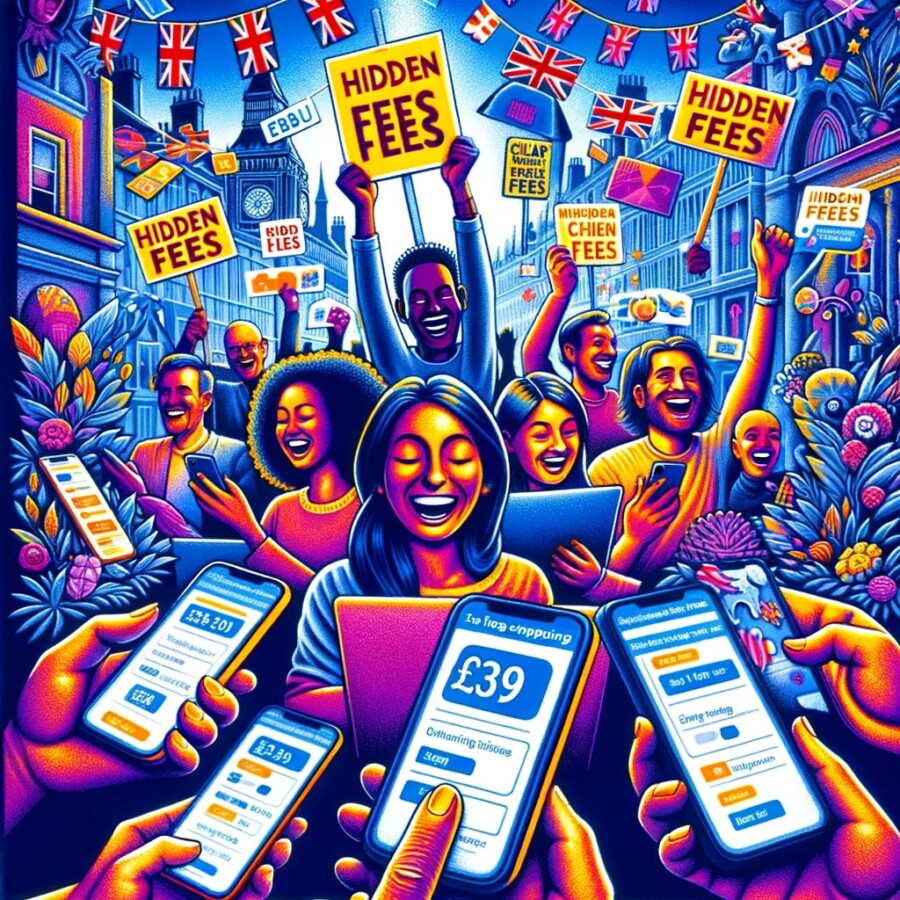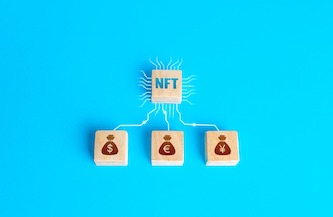Hidden fees for online customers, also called “drip pricing,” will soon be prohibited by new laws. The government conducted a survey on consumer transparency and discovered that some businesses are not clear enough about their prices. The Digital Markets, Competition and Consumers Bill will include these new rules. Drip pricing happens when shoppers see an initial price for a product or service online, but then find out about additional fees during the checkout process. This is common in the entertainment and hospitality industries and costs consumers billions of pounds each year.
The new rules will require mandatory fees to be included in the prices shown online. For example, when buying cinema or train tickets, any required booking fees must be made clear right from the start. Optional extras like airline seat reservations or luggage upgrades will not be included in these measures. The rules are expected to take effect this spring.
Kevin Hollinrake, the Minister for enterprise, markets, and small business, said that while modern-day shopping offers more choices, it also increases the risk of confusion, scams, and unexpected costs. The new Bill aims to help customers compare purchases and protect them from fake reviews. Reviews are widely used by consumers when making purchasing decisions and contributed to the £224 billion spent in online retail markets in 2022. The Competition and Markets Authority (CMA) has provided guidance to address fake reviews and hold website hosts accountable for the reviews on their platforms.
The Price Marking Order (PMO), which requires traders to display the final selling price, will also be reformed. The proposed changes will ensure that unit pricing is consistently applied, even for promotions and special offers, so that shoppers can compare similar products and find the best value. The CMA supports the government’s efforts to combat misleading behavior and protect shoppers from being deceived or losing money.
In conclusion, new laws will ban hidden fees, or drip pricing, for online customers. The government aims to increase transparency in pricing and safeguard consumers from unexpected costs. The new rules will require mandatory fees to be included in the prices shown online, while optional extras will not be included. The government is also taking steps to address fake reviews and ensure that unit pricing is consistently applied. These measures aim to help customers make informed purchasing decisions and effectively compare prices.
Original news source: Drip pricing: Hidden fees for online customers set to be banned (BBC)
🎧 Listen:
Slow
Normal
Fast
📖 Vocabulary:
| 1 | prohibited | Not allowed or banned |
| 2 | transparency | Being open and clear, so you can see or understand easily |
| 3 | consumers | People who buy things or use services |
| 4 | hospitality | Related to businesses that provide food, drink, or a place to sleep |
| 5 | mandatory | Required by law or rules; not optional |
| 6 | reservations | Arrangements made in advance to secure a service or place |
| 7 | scams | Tricks or dishonest plans to steal money or gain an unfair advantage |
| 8 | enterprise | A business or company, especially one that is involved in trade |
| 9 | guidance | Advice or information aimed at resolving a problem or issue |
| 10 | accountable | Being responsible for something and possibly having to explain or deal with the consequences of actions |
| 11 | platforms | Websites or online services where people can post content or interact |
| 12 | traders | People or businesses that sell goods to the public |
| 13 | promotions | Special deals or activities to advertise and increase sales of products |
| 14 | misleading | Giving a false idea or impression |
| 15 | safeguard | To protect or defend from harm or loss |
Group or Classroom Activities
Warm-up Activities:
– News Summary
Instructions: Have students read the article and then summarize the main points in their own words. They can do this individually or in pairs. Afterward, have a class discussion and compare the different summaries to see if any important information was missed.
– Opinion Poll
Instructions: Divide the class into groups and assign each group a specific question related to the article. For example, “Do you think the new laws banning hidden fees will effectively protect consumers?” Have each group discuss and share their opinions on the topic. Then, have a spokesperson from each group present their group’s opinions to the class.
– Headline Creation
Instructions: In pairs or small groups, have students create headlines for the article that capture the main idea in a concise and attention-grabbing way. Encourage them to be creative and use catchy language. Afterward, have students share their headlines and discuss why they chose them.
– Vocabulary Pictionary
Instructions: Select 10-15 key vocabulary words from the article and write them on separate slips of paper. Divide the class into two teams and have one student from each team come to the front of the class. Show them a word and they must draw it on the board within a time limit (e.g., 30 seconds). The first team to correctly guess the word earns a point. Continue until all the words have been drawn and guessed. The team with the most points wins.
– Future Predictions
Instructions: Have students discuss in pairs or small groups what they think the future of online shopping will look like. Will hidden fees continue to be a problem? How might technology and regulations change the way we shop online? Afterward, have a class discussion and share some of the predictions. Encourage students to support their ideas with evidence from the article.
🤔 Comprehension Questions:
1. What is “drip pricing” and why is it a problem for online shoppers?
2. What will the new laws require businesses to do regarding fees shown online?
3. Give an example of a fee that will be included in the prices shown online.
4. What is the purpose of the Digital Markets, Competition and Consumers Bill?
5. How do fake reviews affect consumers and their purchasing decisions?
6. What changes will be made to the Price Marking Order (PMO)?
7. Why does the government want to combat misleading behavior in pricing?
8. How do the new laws aim to help customers when making purchasing decisions?
Go to answers ⇩
🎧✍️ Listen and Fill in the Gaps:
Hidden fees for online customers, also called “drip pricing,” will soon be prohibited by new laws. The (1)______ conducted a survey on consumer transparency and discovered that some businesses are not clear enough about their (2)______. The Digital Markets, Competition and Consumers Bill will include these new rules. Drip pricing happens when shoppers see an initial (3)______ for a product or service online, but then find out about additional fees during the checkout process. This is common in the entertainment and hospitality industries and costs consumers (4)______ of pounds each year.
The new rules will require mandatory fees to be included in the prices shown (5)______. For example, when buying cinema or train tickets, any required booking fees must be made clear right from the start. Optional extras like airline seat reservations or luggage upgrades will not be included in these measures. The rules are expected to take effect this spring.
Kevin (6)______, the Minister for enterprise, markets, and small business, said that while modern-day shopping offers more (7)______, it also increases the risk of confusion, scams, and unexpected costs. The new Bill aims to help customers compare purchases and protect them from fake reviews. (8)______ are widely used by consumers when making purchasing decisions and contributed to the £224 billion spent in online retail markets in 2022. The Competition and Markets Authority (CMA) has provided guidance to address fake reviews and hold website hosts (9)______ for the reviews on their platforms.
The (10)______ Marking Order (PMO), which requires traders to display the final selling price, will also be reformed. The proposed changes will (11)______ that unit pricing is consistently (12)______, even for promotions and special offers, so that shoppers can compare similar products and find the best value. The CMA supports the government’s efforts to combat misleading behavior and protect shoppers from being deceived or losing money.
In conclusion, new laws will ban hidden fees, or drip (13)______, for online (14)______. The government aims to increase transparency in pricing and safeguard consumers from unexpected costs. The new rules will require mandatory fees to be (15)______ in the prices shown online, while optional extras will not be included. The government is also taking steps to (16)______ fake reviews and ensure that unit pricing is consistently applied. These measures aim to help customers make informed purchasing decisions and effectively compare prices.
Go to answers ⇩
💬 Discussion Questions:
Students can ask a partner these questions, or discuss them as a group.
1. What are hidden fees and why are they a problem for online shoppers?
2. How do you feel when you discover additional fees during the checkout process?
3. Do you think it’s fair for businesses to hide fees from customers? Why or why not?
4. Have you ever experienced drip pricing when shopping online? How did it make you feel?
5. What do you think about the new laws that will prohibit hidden fees for online customers?
6. How do you think mandatory fees being included in online prices will benefit consumers?
7. Do you like reading reviews before making a purchase online? Why or why not?
8. Have you ever been influenced by fake reviews when making a purchasing decision?
9. How important is it for you to be able to compare prices when shopping online? Why?
10. What do you think about the government’s efforts to combat misleading behavior in online retail markets?
11. How do you usually compare prices when shopping online? Do you have any strategies?
12. What are some optional extras that you have encountered when shopping online?
13. Do you think it’s fair for optional extras to be excluded from the new rules? Why or why not?
14. How do you think the reforms to the Price Marking Order will benefit shoppers?
15. What are some ways that you can protect yourself from unexpected costs when shopping online?
Individual Activities
📖💭 Vocabulary Meanings:
Match each word to its meaning.
Words:
1. prohibited
2. transparency
3. consumers
4. hospitality
5. mandatory
6. reservations
7. scams
8. enterprise
9. guidance
10. accountable
11. platforms
12. traders
13. promotions
14. misleading
15. safeguard
Meanings:
(A) Arrangements made in advance to secure a service or place
(B) Advice or information aimed at resolving a problem or issue
(C) Required by law or rules; not optional
(D) People or businesses that sell goods to the public
(E) Websites or online services where people can post content or interact
(F) To protect or defend from harm or loss
(G) Related to businesses that provide food, drink, or a place to sleep
(H) Not allowed or banned
(I) Being responsible for something and possibly having to explain or deal with the consequences of actions
(J) Giving a false idea or impression
(K) Being open and clear, so you can see or understand easily
(L) Special deals or activities to advertise and increase sales of products
(M) People who buy things or use services
(N) A business or company, especially one that is involved in trade
(O) Tricks or dishonest plans to steal money or gain an unfair advantage
Go to answers ⇩
🔡 Multiple Choice Questions:
1. What are hidden fees for online customers also called?
(a) Transparent pricing
(b) Optional pricing
(c) Drip pricing
(d) Mandatory pricing
2. What did the government survey on consumer transparency discover?
(a) Some businesses are not clear enough about their prices
(b) Online shopping is becoming more popular
(c) Customers prefer optional extras
(d) The entertainment and hospitality industries have low prices
3. When do shoppers find out about additional fees with drip pricing?
(a) Before they start shopping
(b) During the checkout process
(c) After they receive their purchase
(d) When they compare prices online
4. Which industries commonly use drip pricing?
(a) Technology and manufacturing
(b) Food and beverage
(c) Clothing and fashion
(d) Entertainment and hospitality
5. What will the new rules require for mandatory fees?
(a) They must be paid separately after the purchase
(b) They must be included in the prices shown online
(c) They must be negotiated with the seller
(d) They must be added during the checkout process
6. What will not be included in the new measures?
(a) Required booking fees for cinema or train tickets
(b) Additional fees for luggage upgrades
(c) Optional extras like airline seat reservations
(d) Unit pricing for promotions and special offers
7. What is the aim of the new Bill?
(a) To increase the risk of confusion, scams, and unexpected costs
(b) To encourage businesses to raise their prices
(c) To decrease online retail markets spending
(d) To help customers compare purchases and protect them from fake reviews
8. What will the proposed changes to the Price Marking Order (PMO) ensure?
(a) Consistent unit pricing, even for promotions and special offers
(b) Traders displaying the final selling price
(c) The inclusion of optional extras in the prices shown online
(d) Protection of shoppers from being deceived or losing money
Go to answers ⇩
🕵️ True or False Questions:
1. Hidden fees for online customers, known as “drip pricing,” will continue to be allowed by new laws.
2. The Digital Markets, Competition and Consumers Bill will include the new rules to prohibit drip pricing.
3. The new rules will not require mandatory fees to be included in the prices shown online, such as booking fees for cinema or train tickets.
4. Optional extras like airline seat reservations or luggage upgrades will not be included in these measures.
5. The government aims to decrease transparency in pricing, deceive consumers with unexpected costs, ignore fake reviews, and ensure inconsistent unit pricing for shoppers.
6. The government conducted a survey on consumer transparency and found that all businesses are clear enough about their prices.
7. Drip pricing occurs when shoppers see an initial price for a product or service online, but then discover additional fees during the checkout process.
8. Drip pricing is common in the entertainment and hospitality industries and costs consumers billions of pounds each year.
Go to answers ⇩
📝 Write a Summary:
Write a summary of this news article in two sentences.
Check your writing now with the best free AI for English writing!
Writing Questions:
Answer the following questions. Write as much as you can for each answer.
Check your answers with our free English writing assistant!
1. What are hidden fees or “drip pricing”?
2. Why did the government conduct a survey on consumer transparency?
3. What will the new rules require businesses to do?
4. What is the purpose of the Digital Markets, Competition and Consumers Bill?
5. How will the new laws protect consumers from fake reviews?
✅ Answers
🤔✅ Comprehension Question Answers:
1. What is “drip pricing” and why is it a problem for online shoppers?
Drip pricing is when businesses show an initial price for a product or service online, but then add on additional fees during the checkout process. This can be a problem for online shoppers because it can be misleading and result in unexpected costs.
2. What will the new laws require businesses to do regarding fees shown online?
The new laws will require businesses to include mandatory fees in the prices shown online. This means that any additional charges, like booking fees for cinema or train tickets, must be made clear right from the start.
3. Give an example of a fee that will be included in the prices shown online.
An example of a fee that will be included in the prices shown online is a booking fee for cinema or train tickets. This fee will need to be displayed upfront, so customers know the full cost before making a purchase.
4. What is the purpose of the Digital Markets, Competition and Consumers Bill?
The purpose of the Digital Markets, Competition and Consumers Bill is to increase transparency in pricing and protect consumers from hidden fees and misleading behavior. It aims to help customers compare purchases and make informed decisions while shopping online.
5. How do fake reviews affect consumers and their purchasing decisions?
Fake reviews can mislead consumers and affect their purchasing decisions. If someone reads a positive review that turns out to be fake, they may buy a product or service that doesn’t live up to their expectations. This can result in wasted money and disappointment.
6. What changes will be made to the Price Marking Order (PMO)?
The proposed changes to the Price Marking Order (PMO) will ensure that unit pricing is consistently applied, even for promotions and special offers. This means that shoppers can compare similar products and find the best value, without being deceived by misleading pricing tactics.
7. Why does the government want to combat misleading behavior in pricing?
The government wants to combat misleading behavior in pricing to protect consumers from being deceived or losing money. They believe that businesses should be transparent about their prices and not use hidden fees or misleading tactics to trick customers into paying more than they originally thought.
8. How do the new laws aim to help customers when making purchasing decisions?
The new laws aim to help customers when making purchasing decisions by increasing transparency in pricing. By requiring businesses to include mandatory fees in the prices shown online, customers will have a clearer understanding of the total cost before making a purchase. This will enable them to compare prices more effectively and make informed decisions.
Go back to questions ⇧
🎧✍️✅ Listen and Fill in the Gaps Answers:
(1) government
(2) prices
(3) price
(4) billions
(5) online
(6) Hollinrake
(7) choices
(8) Reviews
(9) accountable
(10) Price
(11) ensure
(12) applied
(13) pricing
(14) customers
(15) included
(16) address
Go back to questions ⇧
📖💭✅ Vocabulary Meanings Answers:
1. prohibited
Answer: (H) Not allowed or banned
2. transparency
Answer: (K) Being open and clear, so you can see or understand easily
3. consumers
Answer: (M) People who buy things or use services
4. hospitality
Answer: (G) Related to businesses that provide food, drink, or a place to sleep
5. mandatory
Answer: (C) Required by law or rules; not optional
6. reservations
Answer: (A) Arrangements made in advance to secure a service or place
7. scams
Answer: (O) Tricks or dishonest plans to steal money or gain an unfair advantage
8. enterprise
Answer: (N) A business or company, especially one that is involved in trade
9. guidance
Answer: (B) Advice or information aimed at resolving a problem or issue
10. accountable
Answer: (I) Being responsible for something and possibly having to explain or deal with the consequences of actions
11. platforms
Answer: (E) Websites or online services where people can post content or interact
12. traders
Answer: (D) People or businesses that sell goods to the public
13. promotions
Answer: (L) Special deals or activities to advertise and increase sales of products
14. misleading
Answer: (J) Giving a false idea or impression
15. safeguard
Answer: (F) To protect or defend from harm or loss
Go back to questions ⇧
🔡✅ Multiple Choice Answers:
1. What are hidden fees for online customers also called?
Answer: (c) Drip pricing
2. What did the government survey on consumer transparency discover?
Answer: (a) Some businesses are not clear enough about their prices
3. When do shoppers find out about additional fees with drip pricing?
Answer: (b) During the checkout process
4. Which industries commonly use drip pricing?
Answer: (d) Entertainment and hospitality
5. What will the new rules require for mandatory fees?
Answer: (b) They must be included in the prices shown online
6. What will not be included in the new measures?
Answer: (c) Optional extras like airline seat reservations
7. What is the aim of the new Bill?
Answer: (d) To help customers compare purchases and protect them from fake reviews
8. What will the proposed changes to the Price Marking Order (PMO) ensure?
Answer: (a) Consistent unit pricing, even for promotions and special offers
Go back to questions ⇧
🕵️✅ True or False Answers:
1. Hidden fees for online customers, known as “drip pricing,” will continue to be allowed by new laws. (Answer: False)
2. The Digital Markets, Competition and Consumers Bill will include the new rules to prohibit drip pricing. (Answer: True)
3. The new rules will not require mandatory fees to be included in the prices shown online, such as booking fees for cinema or train tickets. (Answer: False)
4. Optional extras like airline seat reservations or luggage upgrades will not be included in these measures. (Answer: True)
5. The government aims to decrease transparency in pricing, deceive consumers with unexpected costs, ignore fake reviews, and ensure inconsistent unit pricing for shoppers. (Answer: False)
6. The government conducted a survey on consumer transparency and found that all businesses are clear enough about their prices. (Answer: False)
7. Drip pricing occurs when shoppers see an initial price for a product or service online, but then discover additional fees during the checkout process. (Answer: True)
8. Drip pricing is common in the entertainment and hospitality industries and costs consumers billions of pounds each year. (Answer: True)
Go back to questions ⇧













